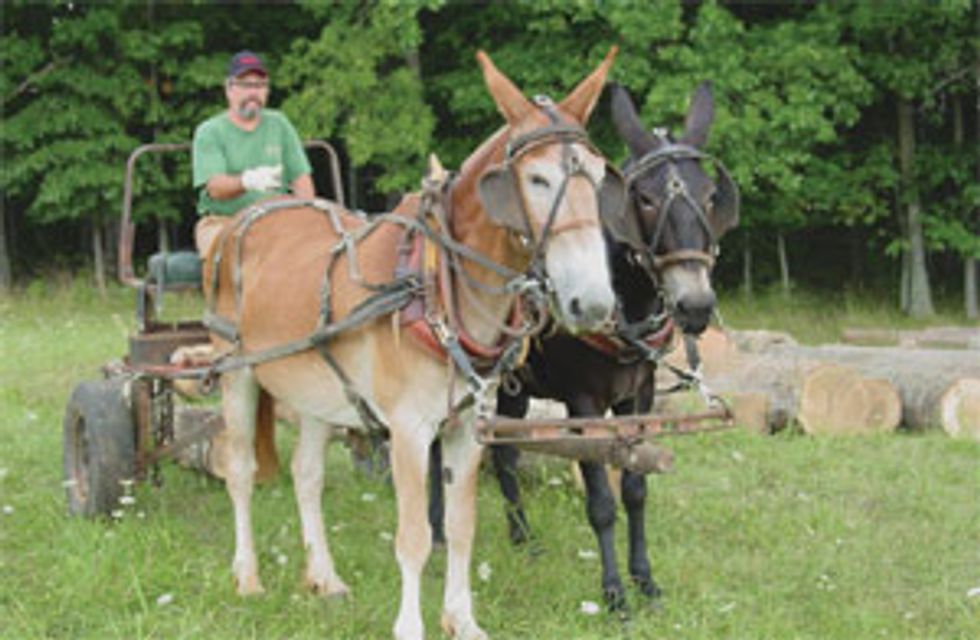Tradition, renaming alternative tonewoods and where all of that Brazilian keeps popping up from.
 Mark Dalton harvests logs the traditional way, with mules Jed and Granny, in Floyd County. |
That said, I believe there’s an area that we will all need to open up our minds to in the coming years—the materials used to build guitars. Many of the traditional materials that have been in use are becoming harder to come by as time goes by. Indian rosewood, for example, still seems to be in good supply, but that can’t last forever. There are some great alternatives that are more plentiful, but it will take a conscious effort to understand that these materials can make great guitars that still sound like we want them to sound.
Tradition
When Jeff Huss and I started our company 14 years ago, we learned what many builders before us had learned—people wanted guitars that were based on the Martin guitars of the 1930s. Of course, this was due to the overwhelming popularity of those guitars, and probably somewhat to the geographic location of our business. After all, a southern guitar company had to build guitars that looked like Grandpa’s Martin, right? I grew up on the music of the Appalachians, and have played rootsbased music all of my life. I also enjoy nothing more than hooking a good pair of mules and pulling some logs out of the woods, or turning some land with them. However, I do think that sometimes guitar players can become somewhat enslaved by tradition. Opening up consumers’ minds to accept alternative tonewoods is not going to be easy, but guitar builders need to lead the way and experiment with various alternatives with the hope of making it an easier transition.
What’s in a Name?
One tonewood that comes to mind is bubinga. My partner and I came across a beautiful board of this wood some years ago, and we are still building an occasional guitar from it. We have found, however, that it is easier to sell these instruments at the retail level if we use the generic (and maybe somewhat misleading) name “African rosewood” to describe it. Some guitar companies have already started to substitute “sapele” for “mahogany.” Sapele is not a true mahogany, though it has very mahoganylike character and qualities, and is quite a viable alternative to Honduran mahogany. In fact, little, if any, of the mahogany we use today actually comes from Honduras, so this change may be more easily made than finding a suitable rosewood substitute in the years to come. For some fingerstyle and DADGAD players who love the sound and looks of Hawaiian koa, the quality and value of Australian blackwood may also prove a viable substitute. True koa is still available, but is harder to find in the master grade wood preferred by most guitar manufacturers. Like koa, Australian blackwood is a true acacia, but any wood called koa must come from Hawaii. Personally, I love to build out of walnut; I like everything about it. Black walnut is native to my home and it is a stable, beautiful wood that makes wonderful guitars. We don’t, however, sell a lot of Walnut guitars because it is not a traditional wood.
Stumped
Like many other builders, we have been blessed in recent years to get our hands on Brazilian rosewood taken from the stumps of the trees cut years ago. Some enterprising fellows discovered that the stumps of the old trees were still there and that the wood could be harvested without cutting any living trees, thereby not only producing old-growth, stable and beautiful Brazilian, but actually saving living trees in the process. Many guitars have been made from this rosewood since it came on the market some 10 years ago, and I can tell you that it is some of the best Brazilian rosewood out there. Unfortunately, we are now hearing that due to the Brazilian government being unable to distinguish between those harvesting the stump wood and those poaching live trees and exporting them in violation of the CITIES treaty, the days of this wonderful wood may be numbered.
So, if a more modern-styled guitar appeals to you—great. Dare to be different! But if, like millions of others out there, you want your guitar to look and sound like Grandpa’s, that’s great, too! Just consider letting us or one of the other terrific American guitar companies build it for you out of Walnut.
Mark Dalton
Mark Dalton is a founding partner of Huss and Dalton Guitar Co. When not building guitars, Mark and his wife, Kimberly, tend to the draft horses and mules that inhabit their farm in the Piedmont region of Virginia.
